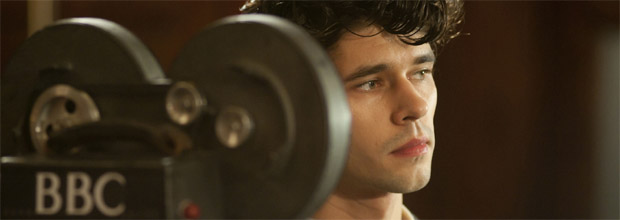
We recently attended the premiere of the first episode of BBC Two’s upcoming drama series The Hour at London’s Princess Anne Theatre, followed by a Q&A session with some of the show’s producers and stars.
There is an inherent problem for any show in the near future that happens to be set in the 1950s or 1960s, and that problem is Mad Men, AMC’s critically-adored exploration of the seismic changes that underwent society during that period, as seen through the eyes of the men and woman who work at an advertising agency. Mad Men has reignited interest in that iconic period, but is also of such high quality that it would be nigh on impossible for any other show to try and match it at its own game.
Wisely, The Hour – set in 1956 and featuring the journalists and reporters that work in a London newsroom as its protagonists – simply doesn’t try. Less soapy than AMC’s hit, chief writer Abby Morgan explains that The Hour took its inspiration instead from films like His Girl Friday, All The President’s Men and Network.
The six-part series focuses on Ben Whishaw’s Freddie Lyon, a budding young reporter who finds himself intensely fed up with the stagnating world of the newsroom. Rather than sit still and calcify, he and colleague Bel Rowley (Romola Gari – “She has to be in all our dramas”) start pitching a more modern news show, one that will be daring and honest, reporting the news in a more innovative way. That show is ‘The Hour’. Unfortunately for Lyon, his dream is trampled on when the station chooses Dominic West’s Hector to present the show instead of him. Elsewhere, outside the world of the newsroom, there are darker deeds afoot, as a professor is brutally murdered in an underground station – a crime which Lyon’s friend, a young and deeply unhappy Debutant, bears some connection to…
The three leads are absolutely terrific, with Whishaw (surely a shoo-in to play The Doctor whenever Matt Smith hangs up his sonic-screwdriver) bringing real life and verve to his roguish young upstart, while West has a whale of a time as the smug and overbearingly charming Hector. But there’s more to the character than just a winning smile, West explains, “After the war, there was deference against the establishment, and Hector bridges that”. As for which one Romola Gari’s free-spirited and headstrong Bel will fall for, it’s anyone’s guess…
The supporting ensemble is also one of the strongest the BBC has assembled in years, including Torchwood’s Burn Gorman as the mystery assassin, alongside Being Human’s Jason Watkins, Julian Rhind-Tutt, Anton Lesser, Tim Piggott-Smith and Oona Chaplin. As BBC Head of Drama Ben Stephenson states with obvious passion and enthusiasm for the show – much like everyone else on the panel – with a cast as deep and talented as this backing up such an involving script, “it’s one of those shows where you just want to spend time with the characters”.
One aspect of The Hour that is comparable to Mad Men is the amount that these characters smoke and drink. There’s nary a scene without a cigarette hanging out of someone’s mouth, or a whisky on their lips; something that should be comfortable territory for West, given his most famous role as alcoholic detective Jimmy McNulty in The Wire. But don’t worry, says West; they weren’t real. “No, they weren’t real cigarettes. They were these horrible marshmallow ones. Horrible. I would much rather die of cancer!” As for the time period itself, as brilliantly realised as it is on the show, it’s not one that West would choose to live in: “I love the suits and the hair, but I’m glad not to really be smoking and eating spam all the time.”
The Hour’s opening, er, hour is a beautifully shot piece, with a real cinematic quality, and the costumes – extravagant period dresses for the ladies and snazzy tweed suits for the men – lend the show a depth and richness that immerse us entirely into its world. This was certainly the intent, as director Coky Giedroyc explains: “the show has got to grab the period by the scruff of the neck and run with it!”
The plot, which also deals with the news world’s reaction to the Suez Crisis over the course of the series, manages to keep a nice balance between the political jostling of the newsroom and the more noir-ish, thriller-like aspects that deal with the murder and Lyon’s investigation of it. That melding of two genres could be jarring, but here the transition between the two is seamless. Giedroyc explains: “the first episode is steeped in the old world, with an oppressive, claustrophobic atmosphere, which get’s lighter and more open as the show reaches Limegrove [the location of new show-within-the-show ‘The Hour’].”
Overall, The Hour is a fascinating, rich and often funny exploration of the evolution of the news program set against a backdrop of the evolution of society, as the roaring fifties moved towards the swinging sixties, but it’s also a terrific drama populated with exciting and well-drawn characters played with real panache by an outstanding cast of British talent. Frankly, we can’t wait to see more. As writer Abby Morgan states, hitting the nail on the head; “The fifties are simply irresistible.”
Watch a preview of this summer’s upcoming BBC drama, including The Hour…
> Follow us on Twitter to get the latest TV news and reviews first.

